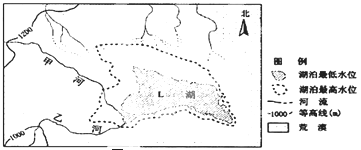问题
选择题
博斯腾湖是我国最大的内陆淡水湖。 风起时波浪滔滔,宛如沧海;风静时波光潋滟,湖水连天。大湖西侧星罗棋布的小湖,湖水相通,萃草浓密,野莲成片,芦苇广布各种水禽栖集其间。而东部沿岸几乎没有。读图回答下列小题。

小题1:关于图中河湖描述正确的是
A.甲河夏季输入该湖泥沙增加
B.甲河对该湖具有排盐作用
C.乙河对该湖具有补给作用
D.甲河流量变化深受L湖影响小题2:造成该湖东、西两岸动植物分布差异的因素包括
①主导风向 ②沿岸坡度 ③土壤肥力 ④湖水盐度
A.①②
B.③④
C.②③
D.②④
答案
小题1:A
小题2:C
题目分析:
小题1:根据图5中河流流向与等高线的凸向相反可知,甲河水流入L湖,乙河中的河水由C提供,我国西北内陆河流汛期在夏季,因此A对,甲河流入L湖后河水没有再出湖,D错;不具有排盐作用,B错;乙河河水主要由L湖提供,说明湖泊对乙河有补给作用,C错。
小题2:据图可知,西岸动植物丰富,是因为河流由高处流下,西岸坡度大,水浅,当位于最低水位时,会露出大量的漫滩,土壤肥沃, 适合植物生长以及鸟类栖息。所以C对;与主导风向无关;该湖为最大内陆湖,所以东西岸盐度差别不大。
